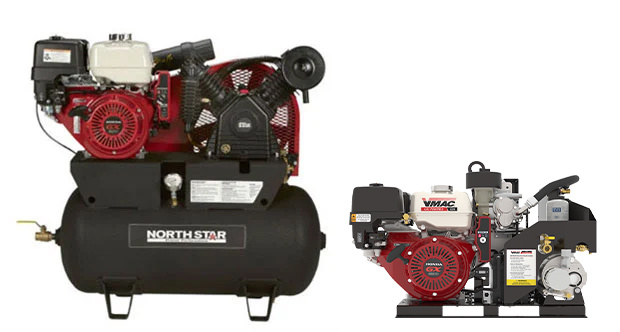Rotary Screw vs. Reciprocating Air Compressors – Performance Comparison
The two most common mobile compressors are rotary screw air compressors and reciprocating air compressors. But what’s the difference between them? In this article, we’ll compare the performance of rotary screw vs. reciprocating air compressors and help you choose the best solution for your work vehicle.
Reciprocating air compressors, also called “recip” or “piston” air compressors, are widely used throughout various service industries due to their price and availability
Meanwhile, rotary screw air compressors provide significantly better performance and require less space, which makes them an attractive alternate option. The image below shows two gas powered air compressors, with a reciprocating air compressor on the left and a rotary screw air compressor on the right:

Comparing Rotary Screw vs. Reciprocating Air Compressors
Both rotary screw and reciprocating air compressors have advantages and disadvantages, which are as follows:
Rotary Screw Advantages
- Continuous airflow/100% duty cycle
- Long lifespan
- Better energy efficiency
- Quieter
- Lifetime warranty*
- Large quantities of air
- Higher CFM per hp
- Air receiver tank is not required
Reciprocating Advantages
- Inexpensive
- Simple maintenance
- Capable of high pressures
*VMAC’s rotary screw air compressors include a VMAC Limited Lifetime Warranty.
Rotary Screw Disadvantages
- More expensive upfront
- Requires skilled maintenance for some systems
Reciprocating Disadvantages
- Interrupted flow rates
- 20% to 50% duty cycle
- Low life expectancy
- Noisy
- Excessive heat
- Maintenance costs
- Requires air receiver tank
Air Compressor Comparison Highlights
Rotary screws have very distinct and important advantages over reciprocating air compressors.
Get Jobs Done Faster
Generally, rotary screw air compressors deliver more air than reciprocating compressors of the same size. Reciprocating compressors require air receiver tanks to handle higher air demands and reduce air pulses created in the compression process. Rotary screw compressors do not create the same air pulses and can deliver large amounts of air without needing a tank. You won’t have to wait for your compressor to keep up with your work, which means you can get jobs faster and complete more jobs in a day!
Work Without Interruption
Rotary screw air compressors operate at 100% duty cycle. The duty cycle is the time a compressor can continuously operate without stopping to prevent overheating in a given time. For example, if a compressor can run for 60 minutes in a 60-minute period without stopping, it operates at 100% duty cycle. If it can only run for 30 of the 60 minutes, it has a 50% duty cycle.
Most reciprocating compressors are only capable of 50% duty cycle, which means those compressors can only operate half the time, reducing your ability to get the job done. A rotary screw compressor runs 100% of the time, so you can do your job without interruption.
Work Worry-Free
Rotary screw air compressors last longer than reciprocating air compressors. Like an engine, reciprocating compressors have piston rings and other components that contact each other and wear over time. With that wear comes a decrease in performance, oil carryover, and more heat generation.
Oil-injected rotary screw compressors use oil to seal the internal rotors, preventing parts from wearing out. Unlike a reciprocating compressor that loses performance with age, the rotary screw compressor maintains the same performance throughout its long life.
Reduce GVW & Free Up Space
Rotary screw air compressors are lighter and provide more capacity in a smaller package than reciprocating air compressors. As a result, vehicles can haul more equipment, tools, and materials and spend less time driving between shops and job sites. Not only can you carry more, but you can also do more.
The rotary screw compressor will provide enough power to operate most hand-held pneumatic tools. From impact wrenches to deburring tools to grinders, you’ll have the air to power your tools whenever you need it.
Why People Prefer Rotary Screw Air Compressors
VMAC surveyed 271 industry professionals in 2024 and discovered that 75% of people prefer rotary screw air compressors over reciprocating.

When asked why they prefer rotary screw air compressors, industry professionals said it was because of performance, quality/reliability, and size/weight.
Meanwhile, the 25% who preferred reciprocating air compressors choose that option because of ease of service and repair, price, and availability.

Read the full survey results here.
Ultimately, if your primary concern is size and weight or job performance from a high-quality system that will last a vehicle’s lifetime, rotary screw air compressors are the way to go. By contrast, if upfront price, ease of repair, and widespread availability are your driving motivators, a reciprocating air compressor may be a better fit for your needs.
Learn More About Rotary Screw Air Compressors
Rotary screw compressors provide many advantages over their reciprocating compressor counterparts. Size, air delivery, duty cycle, and longevity are all factors that firmly favor a rotary screw compressor. Learn more in VMAC’s Guide to Rotary Screw Air Compressors.
